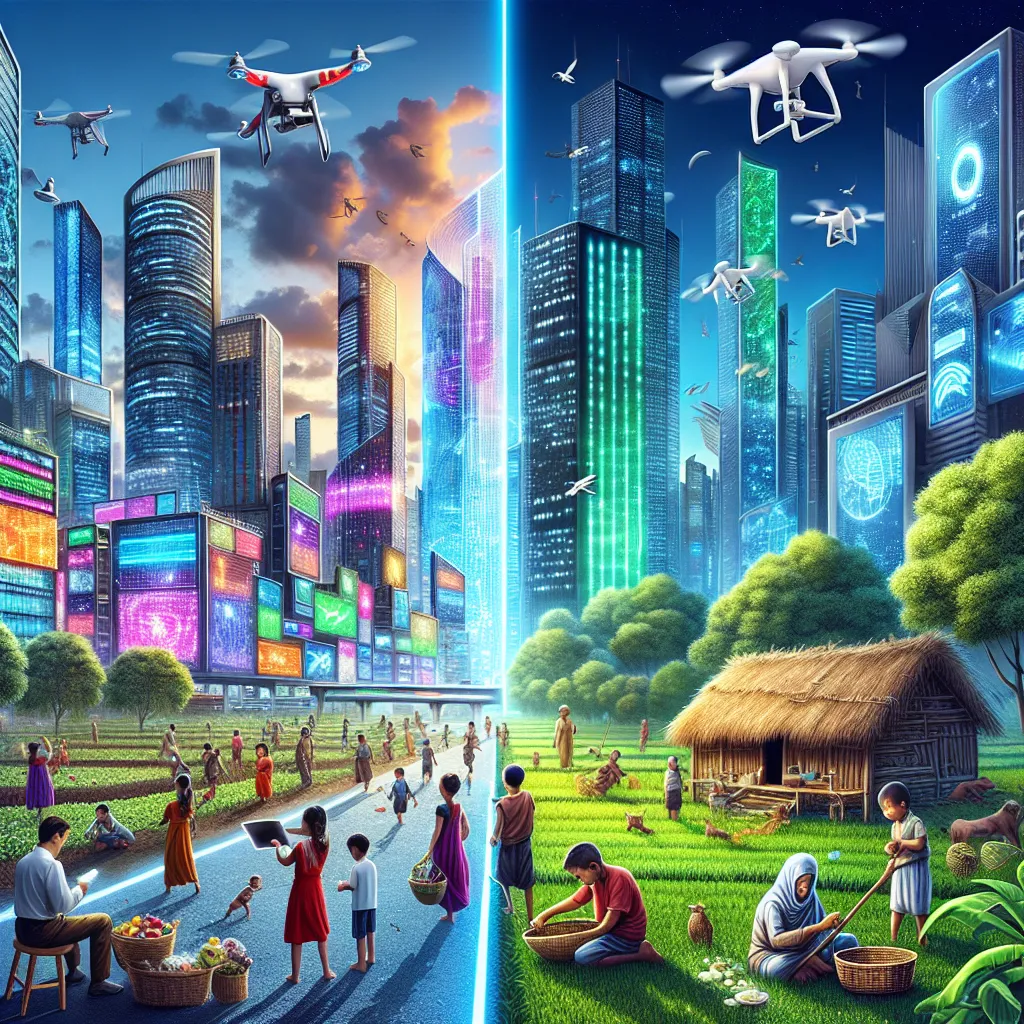Urban inequality has become a pressing issue in modern society, and it’s no surprise that this topic frequently appears in IELTS Writing Task 2 questions. Based on recent trends and the relevance of this subject, we can expect to see more questions related to urban inequality in future IELTS exams. Let’s explore a sample question and analyze how to approach it effectively.
Nội dung bài viết
Some people believe that governments should focus on reducing economic inequality in cities, while others think it’s more important to address rural poverty. Discuss both views and give your own opinion.
Analyzing the Question
This question presents two contrasting views on tackling poverty and inequality:
- Focusing on reducing economic inequality in cities
- Addressing rural poverty
The task requires you to discuss both perspectives and provide your own opinion. It’s crucial to:
- Explain the arguments for both views
- Provide examples or evidence to support each perspective
- State your own opinion and justify it
- Maintain a balanced approach throughout the essay
Now, let’s look at sample essays for different band scores.
Sample Essay for Band 8-9
Urban inequality and rural poverty are two significant challenges that governments face in addressing economic disparities. While some argue for prioritizing the reduction of economic inequality in cities, others emphasize the importance of tackling rural poverty. In my opinion, a balanced approach that addresses both issues simultaneously is crucial for sustainable development.
Those who advocate for focusing on urban inequality argue that cities are the engines of economic growth and innovation. They contend that reducing economic disparities in urban areas can lead to more inclusive development, better access to opportunities, and improved social mobility. For instance, investing in affordable housing, public transportation, and education in cities can help bridge the gap between the wealthy and the underprivileged, creating a more equitable urban environment.
On the other hand, proponents of addressing rural poverty emphasize the often-overlooked challenges faced by rural communities. They argue that rural areas frequently lack basic infrastructure, quality education, and healthcare facilities, which perpetuates the cycle of poverty. By focusing on rural development, governments can prevent mass migration to cities, preserve cultural heritage, and ensure a more balanced national development. For example, initiatives like rural electrification, improved agricultural techniques, and access to markets can significantly enhance the quality of life in rural areas.
In my view, a comprehensive approach that tackles both urban inequality and rural poverty is essential for sustainable and inclusive growth. Neglecting either aspect can lead to imbalanced development and exacerbate existing problems. Governments should implement policies that promote equitable urban development while simultaneously investing in rural infrastructure and opportunities. This balanced strategy can help create a more harmonious society and reduce overall economic disparities.
To achieve this, policymakers could consider the following measures:
- Implement progressive taxation and redistributive policies in urban areas to reduce income inequality.
- Invest in rural education, healthcare, and infrastructure to improve living standards and create local opportunities.
- Encourage the development of secondary cities to bridge the gap between major urban centers and rural areas.
- Promote sustainable agriculture and rural entrepreneurship to boost rural economies.
- Ensure equitable access to technology and digital resources in both urban and rural settings.
In conclusion, while both urban inequality and rural poverty are pressing issues, addressing them in isolation is unlikely to yield sustainable results. A holistic approach that recognizes the interconnectedness of urban and rural development is crucial for creating a more equitable and prosperous society for all citizens.
(Word count: 395)
Essay Analysis
This essay demonstrates excellent qualities for a Band 8-9 score:
-
Task Response: The essay fully addresses all parts of the task, discussing both views and providing a clear personal opinion with a nuanced approach.
-
Coherence and Cohesion: The essay is well-organized with clear paragraphing and effective use of cohesive devices. Ideas flow logically from one paragraph to the next.
-
Lexical Resource: The vocabulary used is sophisticated and precise (e.g., “inclusive development,” “perpetuates the cycle of poverty,” “harmonious society”). There’s a good range of less common words and phrases.
-
Grammatical Range and Accuracy: The essay uses a wide range of complex structures accurately. There’s a good mix of simple and complex sentences, with no noticeable errors.
-
Development of Ideas: Each main point is well-developed with relevant examples and explanations. The concluding paragraph offers a balanced summary and specific policy recommendations.
Sample Essay for Band 6-7
Some people think governments should focus on reducing economic inequality in cities, while others believe addressing rural poverty is more important. In my opinion, both issues are significant and need attention.
Those who support focusing on urban inequality argue that cities have a lot of economic differences. Rich and poor people live close to each other, which can cause social problems. For example, in big cities, you can see expensive apartments next to slums. This can lead to crime and unhappiness. If governments work on reducing these differences, it could make cities safer and more fair for everyone.
On the other hand, people who think rural poverty is more important say that countryside areas are often forgotten. Rural areas usually have fewer jobs, worse schools, and less access to healthcare. This makes life very hard for people living there. For instance, many young people leave villages to find work in cities, which makes rural areas even poorer. If governments help rural areas, it could stop this problem and make life better for rural people.
I think both urban inequality and rural poverty are big problems that need to be solved. Cities are important because they have many people and create a lot of money for the country. But rural areas are also important because they produce food and have cultural value. If we only focus on one, the other might get worse.
Governments could do these things to help both:
- Make better schools and hospitals in both cities and rural areas.
- Create more jobs in rural areas so people don’t have to move to cities.
- Improve public transportation in cities to help poor people get to work easily.
- Give financial help to farmers to make rural life better.
In conclusion, I believe that governments should try to reduce both urban inequality and rural poverty at the same time. This way, the whole country can develop together and become more fair for everyone.
(Word count: 329)
Essay Analysis
This essay demonstrates qualities suitable for a Band 6-7 score:
-
Task Response: The essay addresses all parts of the task, discussing both views and providing a personal opinion. However, the ideas could be more fully developed.
-
Coherence and Cohesion: The essay has a clear structure with separate paragraphs for each main idea. Some cohesive devices are used, but they could be more varied.
-
Lexical Resource: The vocabulary is adequate for the task, with some attempts at less common words. However, there’s some repetition and the range could be broader.
-
Grammatical Range and Accuracy: The essay uses a mix of simple and complex sentences with generally good control. There are no major errors that impede understanding.
-
Development of Ideas: Main points are supported with examples, but they could be more specific or detailed. The conclusion summarizes the main points effectively.
 Urban inequality illustration
Urban inequality illustration
Key Vocabulary to Remember
- Economic disparity (noun) – /ˌiːkəˈnɒmɪk dɪˈspærəti/ – difference in economic well-being between different groups
- Social mobility (noun) – /ˈsəʊʃl məʊˈbɪləti/ – the ability to move between different social classes
- Inclusive development (noun phrase) – /ɪnˈkluːsɪv dɪˈveləpmənt/ – growth that benefits all segments of society
- Rural electrification (noun phrase) – /ˈrʊərəl ɪˌlektrɪfɪˈkeɪʃn/ – the process of bringing electrical power to rural areas
- Redistributive policies (noun phrase) – /ˌriːdɪˈstrɪbjʊtɪv ˈpɒləsiz/ – policies aimed at reducing economic inequality
- Sustainable agriculture (noun phrase) – /səˈsteɪnəbl ˈæɡrɪkʌltʃə/ – farming practices that protect the environment and ensure long-term food production
- Progressive taxation (noun phrase) – /prəˈɡresɪv tækˈseɪʃn/ – a tax system where higher earners pay a higher percentage of tax
- Urban-rural divide (noun phrase) – /ˈɜːbən ˈrʊərəl dɪˈvaɪd/ – the economic and social differences between urban and rural areas
- Equitable access (noun phrase) – /ˈekwɪtəbl ˈækses/ – fair and impartial access to resources or opportunities
- Holistic approach (noun phrase) – /həˈlɪstɪk əˈprəʊtʃ/ – considering all aspects of a situation when making decisions or plans
Conclusion
Urban inequality is a complex issue that requires careful consideration in IELTS Writing Task 2 essays. By understanding the various perspectives and using appropriate vocabulary and structures, you can craft a well-balanced and insightful response. Remember to practice writing essays on this topic, considering different angles such as:
- The role of technology in addressing urban inequality
- The impact of globalization on urban-rural disparities
- Government policies to promote inclusive urban development
- The relationship between urban inequality and environmental issues
We encourage you to write your own essay on this topic and share it in the comments section below. This practice will help you refine your writing skills and prepare effectively for the IELTS exam. Good luck with your preparation!


